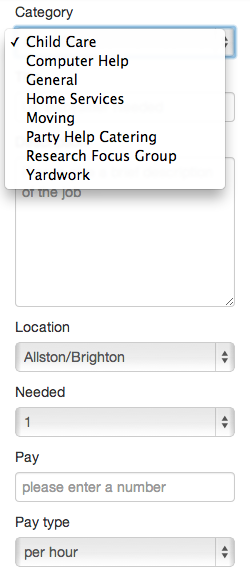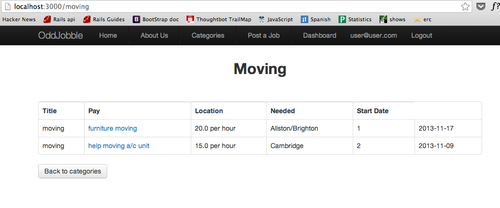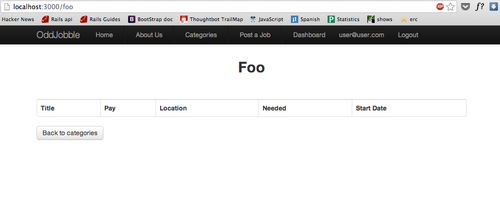Restricting Url Parameters
I’m working on a job board for Boston area residents to post odd jobs for college students to complete.
When a user is filling out the form to post a new job they must decide which category their job falls under. For example if a user needs a student to help them with moving furniture they select the Moving category. If they need a babysitter for the weekend they select the Child Care category. Since category is an attribute of a job object I am able to query for jobs according to category.

I have a dynamic route at /:category that directs users to the index action of
the jobs controller and sets params[:category] to /:category.
routes.rb
match "/:category", to: "jobs#index", as: :category
The header tag for the index view is dynamic to be params[:category]. For example if a user navigates to /Moving the index view is displayed with header Moving, listing all of the moving jobs.

This is great! A user can find jobs based on a certain category by visiting
/:category and easily tell which jobs they are viewing by looking at the large,
bold header or the url.
Then I came across a problem. Since the route and and header tags were dynamic the user could pass any value into the url and my job board had no way of determining if this was a valid category or not. Users would be directed to a view with a header matching params[:category] whether it was a valid category or not.
Let’s say the user navigated to /Foo. They would see the index view with a header Foo and a blank table.

I needed to come up with a way to validate that a category was valid or not. My Job Board had to know that moving was a valid category and foo was not.
Luckily for me I had been playing around with a lot of methods that Ruby’s
Enumerable Module provides us with and remembered an awesome include method. You can call include on any collection and pass it a parameter, and
ruby checks if the collection contains this parameter. It returns a boolean
value, true if it does include the value, and false if it does not.
Perfect! All I need to do is make a collection of all of the valid categories,
iterate through it and check to see if it includes params[:category]. So, I
did exactly that.
jobs_controller.rb
def index
categories - %w(child-care computer-help general home-services
moving party-help-catering research-focus-group yardwork)
if categories.include?(params[:category])
@jobs = Job.where(category: params[:category])
else
render "jobs/not_a_category_error"
end
end
I added an array to the index action of the jobs controller, checked to see if the category was valid, and used a conditional statement to dictate where to direct the user . If the value is a valid category (returns true) it lists all of the jobs of the given category. If the value is not a valid category (returns false) the user is redirected to an error page.
not_a_category_error.html.erb

Part II: Refactoring
Great, everything is working. Now time for some refactoring. Rails has many conventions or best practices, one of which is known as “skinny controller, fat model.” Following this convention, I decided to extract the categories into the Job model and make it a constant.
job.rb
class Job < ActiveRecord::Base
CATEGORIES = %w(child-care computer-help general home-services
moving party-help-catering research-focus-group yardwork)
Now I am able to access this constant using Ruby’s :: operator and do the same sort of validation as before.
jobs_controller.rb
def index
if Job::CATEGORIES.include?(params[:category])
@jobs = Job.where(category: params[:category])
else
render "jobs/not_a_category_error"
end
end
Read Parameterizing object attributes, to learn further how to refactor this code.